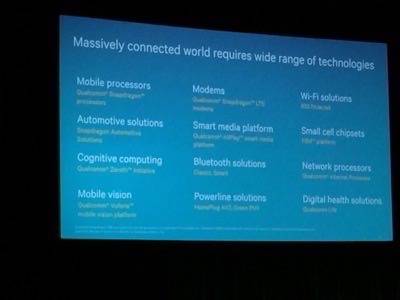
Connecting your home, car, body and city to the Internet looks set to go from sci-fi fantasy to inevitability. And when that future finally becomes our de facto way of life, Qualcomm wants to make sure that its parts are running that multitude of devices and appliances.
Which explains the chipmaker’s deep interest in bringing forth its vision for the “Internet of Everything” (more commonly known as the “Internet of Things” by almost everyone else). At a press event in San Francisco, Qualcomm president Derek Aberle and other executives laid out plans for new processors; a plug for AllJoyn, Qualcomm’s open-source system for inter-device awareness and communication; and the AllSeen Alliance, the group it co-founded to drum up support for AllJoyn.
It may seem like an elaborate play for a company with little name recognition outside people who really care about smartphone processors. But Qualcomm insists that its experience in mobile may be its strongest asset in the Internet of Things—er, Everything.
All Your Gizmos Are Belong To Us

According to Aberle, Qualcomm thinks 5 billion connected devices will ship by the time 2018 winds down. To grab as much of that market as possible, the company just announced two new IoT-oriented processors, the QCA401x and QCA4531 Wi-Fi-based chips, to connect gadgets and their sensors and apps. But hardware’s only part of the puzzle.
On the audio front, its AllPlay SAM (Specialized Audio Module) just got a new Bluetooth stack, so companies don’t have to build their own, plus improvements that let users stream audio that’s jacked in over line-in/aux ports. Basically, AllPlay vendors interested in better wireless audio features may not have to do much more than stuff in Qualcomm’s chip.
Consumers don’t want to fuss with gadgets, just to get them to work together. Qualcomm thinks even disparate gadgets from different brands can and should all work seamlessly—ideally, of course, under the banner of AllJoyn, the Internet of Things system it developed and then open-sourced. Qualcomm says 140 companies are now members—including Microsoft, which just joined this past year.
Of course, membership doesn’t always imply exclusive support; companies sometimes hedge their bets by joining multiple alliances. And Qualcomm’s ambition pits it in a race against other giants, including chipmakers Intel and Broadcom, as well as Samsung and Apple.
So huge is Apple’s play, in fact, that it doesn’t seem to have it all together yet. Fortune reports that Apple’s HomeKit initiative—which intends to unite various smart-home products under an Apple-controlled framework—probably won’t launch until the fall, instead of sometime over the summer as expected.

Meanwhile, Qualcomm has been drumming up support for a few years. And while the maker of Snapdragon processors for smartphones and tablets might seem like an odd would-be leader for the Internet of Things, Qualcomm—of course—figures that this mobile expertise gives it a leg up.
Mobile technology’s challenges—like physical size constraints, battery life and security—tend to overlap with those of smaller connected devices, said Raj Talluri, a Qualcomm vice president for product management. “We spent a lot of time bringing security to smartphones,” he said, “and we’re bringing that to this space.”
Photos by Adriana Lee for ReadWrite

















